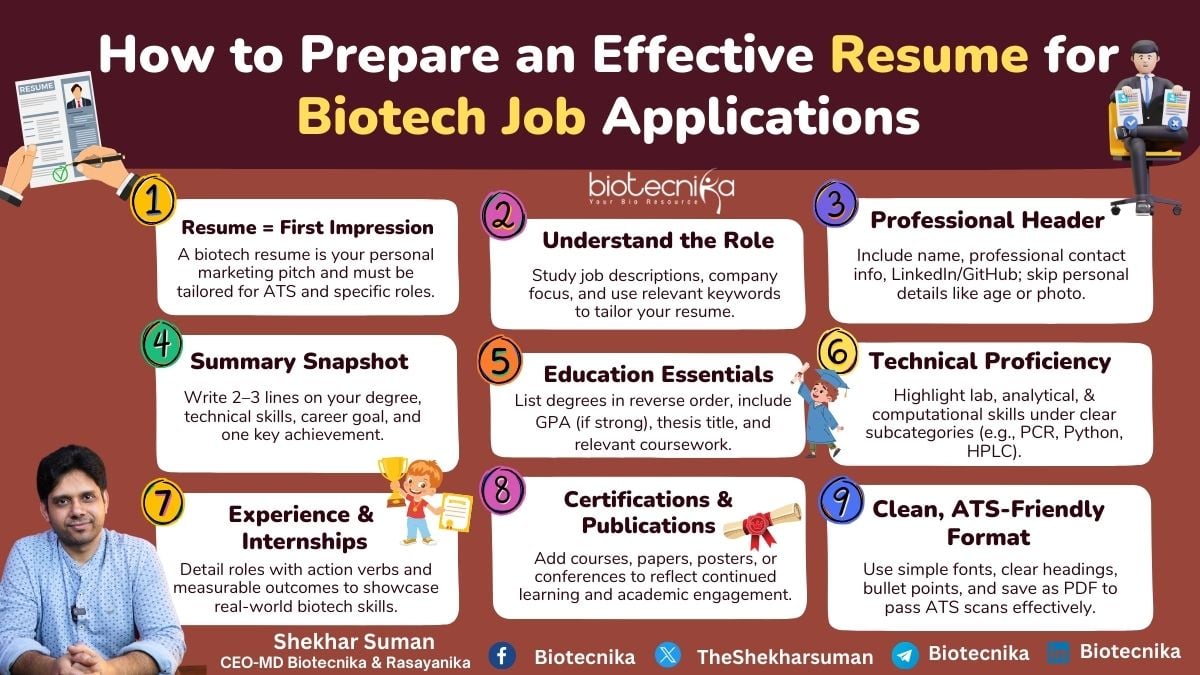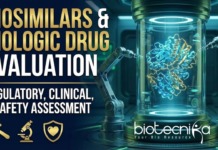Table of Contents
Effective Biotech Resume
In the competitive biotech industry, an effective biotech resume is more than a summary. It’s your personal marketing pitch to potential employers. In a biotech industry that thrives on precision, innovation, and scientific expertise, your resume must do more than check boxes, and it needs to showcase your qualifications, highlight your technical capabilities, and communicate your potential to contribute in a lab, clinic, or corporate research environment.
Whether you are a fresher entering biotechnology, a master’s student ready to transition into industry, or a Ph.D. candidate seeking advanced roles in research and development, your resume is the first impression that could open the door to exciting opportunities.
The biotech job market is competitive and highly specialized, and hiring managers often spend less than 10 seconds scanning each resume. So, how do you make yours stand out?
This article will guide you through a clear, step-by-step process to craft a compelling, professional biotech resume that will not only get noticed but also be shortlisted. Let’s turn your research background into a job-winning story.
1. Understand the Biotech Job Role You’re Applying For
Before applying, research the job posting thoroughly. Biotech roles vary widely from Clinical Research and Genetic Engineering to Regulatory Affairs and Computational Biology. Each requires specific skill sets and experiences.
Action Steps:
-
Analyze the keywords in the job description (e.g., PCR, Data Analysis, Regulatory Documentation)
-
Understand the company’s focus (pharmaceuticals, agriculture, diagnostics, etc.)
-
Tailor your resume to the job description—this boosts your ATS pass rate
2. Start with a Strong Resume Header To Make Your Biotech Resume Look Effective
This first section must provide essential contact information in a clean, professional format.
Include:
-
Full Name (bold or larger font)
-
Professional Email Address (avoid casual ones)
-
Phone Number
-
LinkedIn Profile (custom URL if possible)
-
Personal Website, GitHub, or ResearchGate (if applicable)
Avoid: Personal details like marital status, gender, age, or photos unless explicitly required.
3. Write a Compelling Professional Summary
For an Effective Biotech Resume, add A snapshot of your profile in 2–3 sentences. Summarize your education, technical strengths, and career objective.
Include:
-
Your degree and specialization
-
Key technical or lab skills
-
Career focus or aspiration
-
Optional: One achievement (e.g., published paper)
Example:
“M.Sc. Biotechnology graduate with hands-on experience in DNA sequencing, ELISA, and microbial culture techniques. Looking to apply molecular biology skills in a research-driven pharmaceutical company.”
4. Highlight Your Education Clearly
Education forms the foundation of a biotech resume, especially for entry-level applicants. List in reverse chronological order.
Include:
- Degree earned (B.Sc., M.Sc., M.Tech, Ph.D.)
- Full institution name
- Dates attended or graduation year
- Academic honors, GPA (if ≥ 3.5/4.0 or 75%)
- Optional: Relevant coursework (Genetic Engineering, Immunology)
- Thesis or dissertation title with a brief description
Example:
M.Sc. Biotechnology, XYZ University
Graduated: 2023 | GPA: 8.5/10
Thesis: “Evaluating CRISPR-based Gene Editing in Bacterial Resistance Mechanisms”
5. Showcase Your Technical and Laboratory Skills for An Effective Biotech Resume
Employers want to know what tools and methods you can use without training. Divide into categories.
- Molecular Techniques: PCR, qPCR, RT-PCR, Gel Electrophoresis
- Protein Techniques: ELISA, Western Blot, SDS-PAGE
- Microbiology: Culture Techniques, Gram Staining, Antimicrobial Testing
- Bioinformatics/Computational: BLAST, NCBI Tools, Python, R
- Analytical Tools: Spectrophotometry, HPLC, Flow Cytometry
- Software: GraphPad Prism, Microsoft Excel, BioEdit
List only skills you can confidently apply in a project setting.
6. Include Relevant Work Experience or Internships
Demonstrate real-world experience in research labs, industry, or internships for an Effective Biotech Resume
Structure:
- Job/Internship Title
- Organization Name
- Dates (Month & Year)
- 3–5 bullet points detailing tasks and outcomes
Tips:
- Start bullets with action verbs (Analyzed, Designed, Assisted)
- Quantify outcomes (Reduced contamination by 15%)
- Emphasize teamwork, accuracy, and time management
Example:
Research Intern, ABC Biotech Ltd.
Jan 2023 – Jun 2023
-
Performed DNA isolation and PCR amplification for 60+ samples
-
Analyzed protein expression using Western blotting
-
Maintained lab reports and documented SOPs under GLP guidelines
7. Add Certifications and Training for An Effective Biotech Resume
Certifications show a willingness to learn and specialize.
Include:
- Course title
- Platform or institution (Coursera, NPTEL, edX)
- Completion year
Example:
Certified in “Next-Generation Sequencing” – Illumina Academy (2023)
“Bioinformatics with Python” – Coursera, Johns Hopkins Univ. (2022)
Industrial Training in GMP – Biotech Institute (2022)
8. Mention Publications, Posters, or Conferences (If Any)
Highlight any scientific communications.
Structure:
- Title of publication/poster
- Journal or conference name
- Year
Example:
“Effects of CRISPR on E. coli Gene Regulation” – Int. Journal of Microbial Research, 2023
Poster: “Innovative Antimicrobial Strategies” – BioAsia 2024
9. Soft Skills and Languages (Optional)
Soft skills demonstrate team fit.
- Strong verbal and written communication
- Critical thinking
- Attention to detail
- Leadership and teamwork
- Foreign languages (German, French, Mandarin)
10. Format Your Resume Neatly and Professionally
First impressions matter.
Tips:
- Font: Calibri, Arial, or Times New Roman (11–12 pt)
- Bold, clear headings (e.g., Work Experience)
- Bullet points, not paragraphs
- 1″ margins and consistent spacing
- 1–2 pages max (1 page for freshers; 2 pages for extensive publications)
- Save as PDF to preserve formatting
Bonus: Tailor for Applicant Tracking Systems (ATS)
- Use plain-text keywords from the job description
- Avoid tables, graphics, and images
- Stick to standard section headings
- Skip special characters and fancy fonts
Crafting an effective biotech resume takes effort, but it’s an investment that pays off. Focus on clarity, relevance, and customization. Whether you’re targeting R&D, pharmaceutical, or regulatory roles, your resume should tell a clear, confident story of your journey.
































